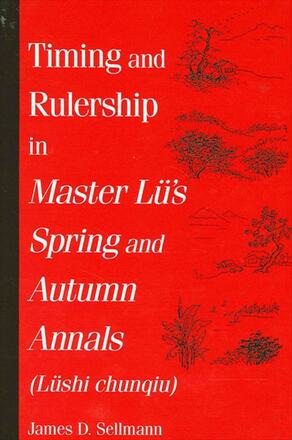
Timing and Rulership in Master Lü's Spring and Autumn Annals (Lüshi chunqiu)
Alternative formats available from:
Explores proper timing and the arts of rulership in the work that inspired China's first emperor.
Description
Master Lü's Spring and Autumn Annals (Lüshi chunqiu) inspired the king who united the warring states to become China's first emperor. In this work on the Lüshi chunqiu, author James D. Sellmann finds that the concept of "proper timing" makes the work's diverse philosophies coherent. He discusses the life and times of its author, Lü Buwei, and the structure of the work. Sellmann also analyzes the role of human nature, the justification of the state, and the significance of cosmic, historical, and personal timing in the Lüshi chunqiu. An organic instrumentalist position begins to emerge from the diverse theories of the Lüshi chunqiu. In conclusion, Sellmann looks at the implications of the syncretic philosophies of the Lüshi chunqiu for contemporary conceptions of time, human nature, political order, and social and environmental ethics.
James D. Sellmann is Professor of Philosophy and Director of East Asian Studies at the University of Guam.
Reviews
"…an eponymously timely discussion of a topic that is often overlooked in recent studies of Chinese Philosophy. " — Dao: A Journal of Comparative Philosophy
"Sellmann's book … is relevant not only as a study on a yet somewhat neglected text but also as an exploration into some basic concepts of ancient Chinese thought that, particularly in the case of time and timing, have not yet been given adequate academic attention. " — China Review International
"Sellmann's is an engaging and interesting study of a fascinating work, and should appeal to all interested in philosophy and intellectual history of the times around and during Qin rule, with special appeal for anyone interested in applied eclecticism. " — Nachrichten
"Sellmann … provides an important contribution to our understanding of the common roots of Confucian, Taoist, and even Buddhist ideals. Overall, a sound, thoughtful, and worthwhile analysis. " — Religious Studies Review
"The book is grounded in the original text of the Lüshi chunqiu; it offers a new perspective on zajia, or syncretic philosophy in ancient China. Although 'time' and/or 'proper timing' are discussed in Western philosophy, the concept has received little direct attention in Chinese philosophy, which is somewhat unusual because the issue is so central to understanding Chinese thinking. Sellmann provides a significant and devoted study to the concept of time and proper timing and the book is a first step in addressing the topic's neglect. " — David Jones, Kennesaw State University
"The book presents its own philosophy which Sellmann clarifies by emphasizing the idea of timing in both the extrinsic and intrinsic sense. It is important as a survey of earlier traditional positions, as well as for its influence on later forms of Confucianism, Neo-Confucianism, and even Daoism and Buddhism. " — Alan Fox, University of Delaware